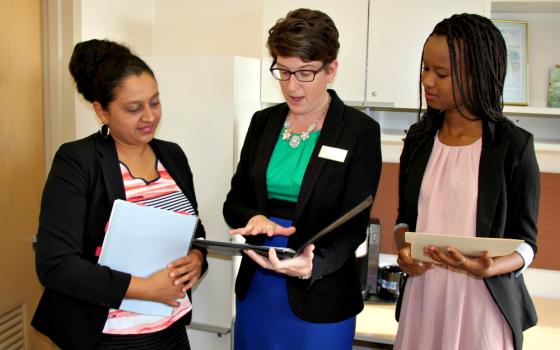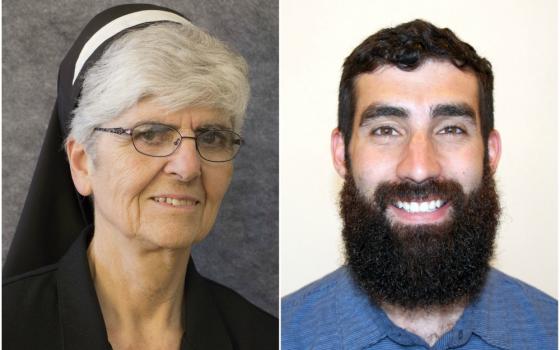Silver Lake College, based in Manitowoc, Wisconsin, adopted the "earning while learning" method last year, making it the only Catholic work college in the United States.
The institution — which the Franciscan Sisters of Christian Charity founded in 1885 — is still in the process of becoming federally recognized and funded (to join nine other U.S. work colleges). But it is in its second year of requiring students to work 10 hours a week as part of the curriculum. The bulk of the students' earnings go toward their tuition.
Franciscan Sr. Lorita Gaffney, vice president of mission integration at Silver Lake College, said this program is an extension of the school's Franciscan values: emphasizing the dignity of work, and the responsibilities to one another and to society.
"A lot of parents want to know, why am I sending my kid to college if he's not going to get a job?" Gaffney said. The work program "gives them a work résumé, as well as an academic résumé."
"It's teaching them poise and professional responsibility; it prepares them," she added.
This approach is also meant to help ease the burden of student debt, but it's also intended to introduce students to workplace expectations before graduating, said Matt Goff, dean of the department that oversees the work program, SLC Works.
"The one thing that's been surprising — but not surprising — is the number of students who come in with literally no work experience, with no concept of what it's like," he said. "We have students who come in and don't understand that showing up to work late is not appropriate. We have students who have never received a paycheck, who never had a checking account because that's something they've never needed.
"If they hadn't come here or gone through this, the first time they'd be experiencing this would be after they graduate."
As of this academic year, all residential students will participate in the work program as a condition of enrollment, with campus jobs ranging from academic tutoring to food service, athletics to marketing.
The college randomly places first-year and transfer students into on-campus jobs, mainly to emphasize that all jobs are important and that, regardless of one's ACT score, every position offers a learning experience. Their second year students are able to apply and interview for positions of their choice.
According to the Work Colleges Consortium, graduates of the country's work colleges see benefits from this experience carry over into their professional lives. Almost 85 percent say the experience helped build self-confidence. And nearly 90 percent of graduates all say that their work experience helped them develop good communication skills, learn how to work cooperatively in groups and teams, and that it was an important way to reduce their college costs.
Paychecks go toward paying off the student's tuition. But after getting feedback from students on their lack of spending money, Silver Lake College tweaked the initial approach: Now freshmen can keep $35 (upperclassmen, $45) per paycheck as pocket money, rather than all of it going straight to pay off their debt.
"This was a response to students," Goff said. "It was fully their input, coming in and voicing their concerns and wants, and us making a shift toward that."
One student who works under Goff for the SLC Works department, sophomore Tori Jonet, helps facilitate student feedback.
Jonet, 20, from Luxemburg, Wisconsin, said that one factor in choosing Silver Lake College was that it made working during college easy. Few employees are flexible with students working only a few months out of the year, she said.
"For me it helps with not having to take out that extra loan at the end of the year, or work an extra job," she said. "You have a job on campus that keeps you busy, but not too busy."
Jonet worked as a barista her freshman year at Silver Lake at an on-campus coffee shop. Now as a student manager, she holds weekly orientations with new students to improve communication in the department and helping figure out how students can fit into their new jobs.
She hopes to become a teacher in secondary education, and her two jobs in the work program have helped her grow out of her shyness and practice taking charge of classroom settings.
"I was so nervous that I wouldn't be able to interact with students," she said. "I was so intimidated, but now I feel so much more comfortable. Even with professors or coworkers, I learned how to communicate so much better."
Once students are juniors and seniors, they move up to supervisory positions on and off campus, including internships in their field of study. Upperclassmen also attend a career fair that the college organizes. Gaffney said that, for the job fair, faculty and staff help by collecting slightly used business clothes for students.
"We're still doing a lot of test-driving," she said.
Though last year's fair just offered on-campus positions, Goff said he anticipates bringing in off-campus positions at future fairs.
"I'm not interested in sending our juniors and seniors into positions where they will just answer phones," he said. "They can do that here and not have the commute. I want the off-campus jobs to be positions where they are getting legitimate professional experience, or perhaps some mentoring by their supervisor, and my hope is for potential opportunities for them getting hired."
He added that the shift to a work college has also changed the demographic makeup of the school. A lot more students are coming from inner city Milwaukee and Chicago, with a slight decrease in the percentage of Catholic students.
With a population around 34,000, Manitowoc and its surrounding area is heavy on manufacturing, blue-collar work. But businesses struggle to retain people in the midlevel jobs for people with bachelor's degrees, Goff said.
"One of the things we're talking about is our community workforce development in general, and how our work college can play a role in that," he said. "We're attracting young college students, young talent, here to the community, then retaining them as we hire them out as they go through a trial period in internships."
Silver Lake College holds the same standards for students in the workplace as they do for academics: poor performance in the job is like failing a class. But before students are kicked out of the college, they go through a corrective process where they meet with their supervisors to learn how they can improve, and, if necessary, go through various levels of probation before reaching suspension from campus for that semester.
"A lot of these kids have not worked a day in their lives," Gaffney said. "So the supervisors are sometimes pulling their hair out trying to teach these kids the importance of showing up on time, the importance of not sleeping on the job, proper dress attire."
Their final chance is a one-week reflection period, in which students work for Goff for a week and have meetings around campus "to help them reflect on who they want to be when they get out of college, and how their actions are impacting what their future is looking like," he said.
Rarely does it get to that point, however. Usually, Goff said, a written warning or an upfront conversation is enough to inspire change in the student's performance.
Adding the work aspect to a small Catholic college has helped Silver Lake carve out a niche in an otherwise saturated market of higher education, Gaffney said. And in one year, they've already seen results. Compared to 56 incoming freshmen last year, this year Silver Lake College had 95 full-time freshmen enroll this fall. Currently, 170 students are employed throughout campus (with a few off campus).
Goff added that he thinks the program plays a part in student retention; as soon as they start school, they already have connections around campus, including a supervisor they see 10 hours a week, coworkers, an adviser, and faculty, all in addition to their classmates and peers.
"A lot of people ask us, 'Are you doing this so that you have cheap labor?' Absolutely not," he said, adding that until they become federally funded, it's actually more expensive for Silver Lake to take on the work program, as well as more work for its faculty, with many having to take on the supervisor role on top of their full teaching loads. The whole campus had to be on board for the school to adopt this model.
"They just really believe in what the work college is, and they support it."
[Soli Salgado is a staff writer for Global Sisters Report. Her email address is ssalgado@ncronline.org. Follow her on Twitter: @soli_salgado.]



